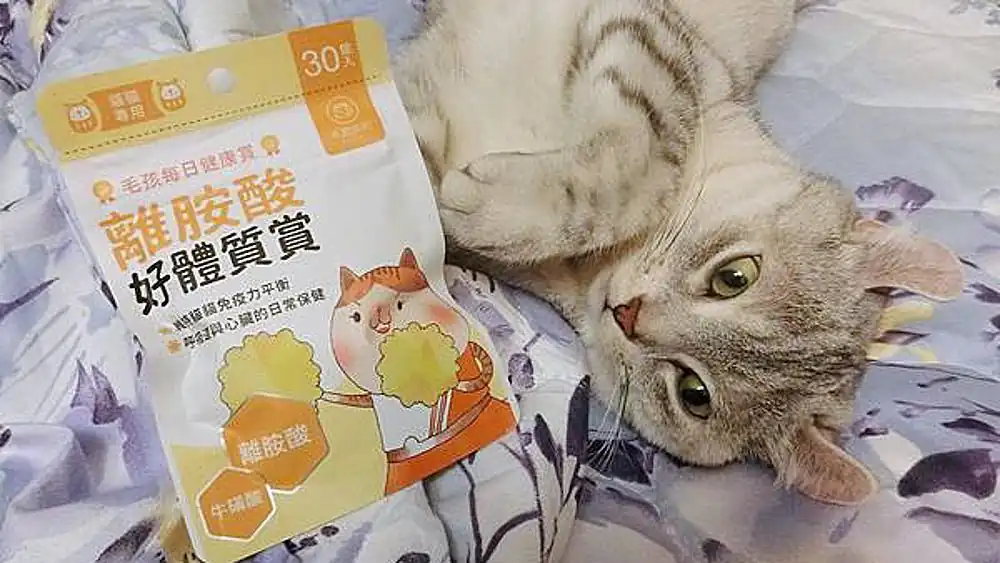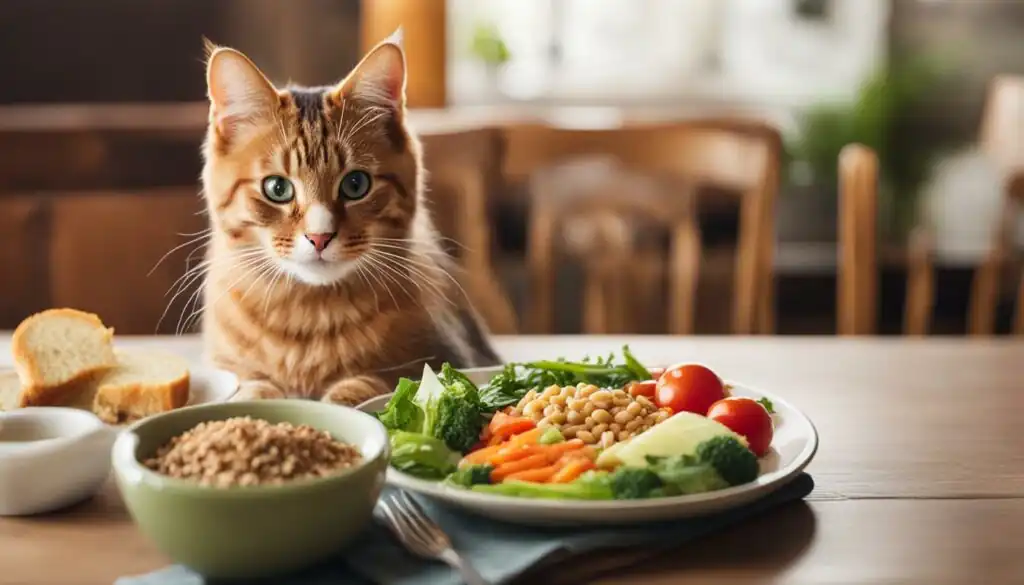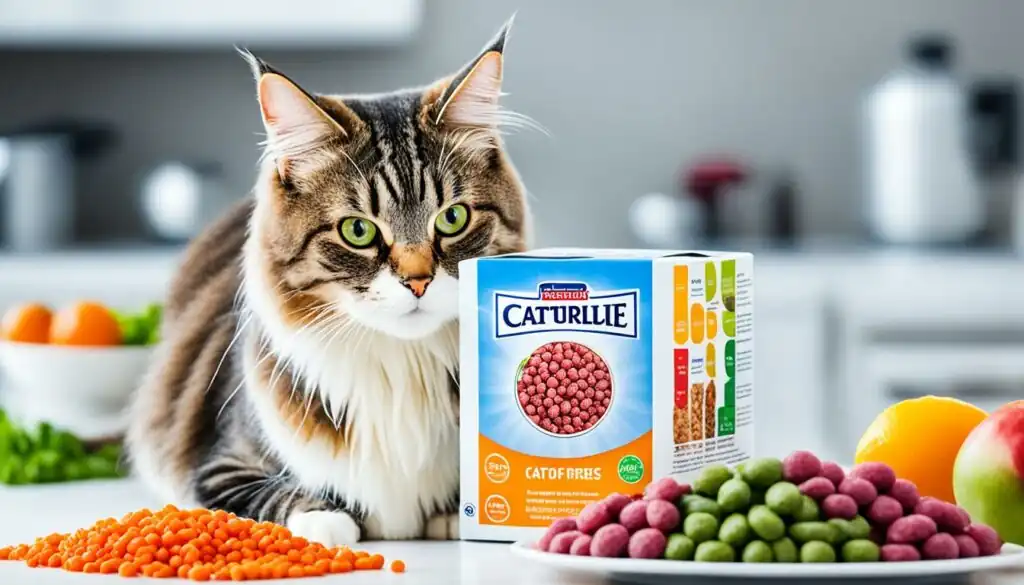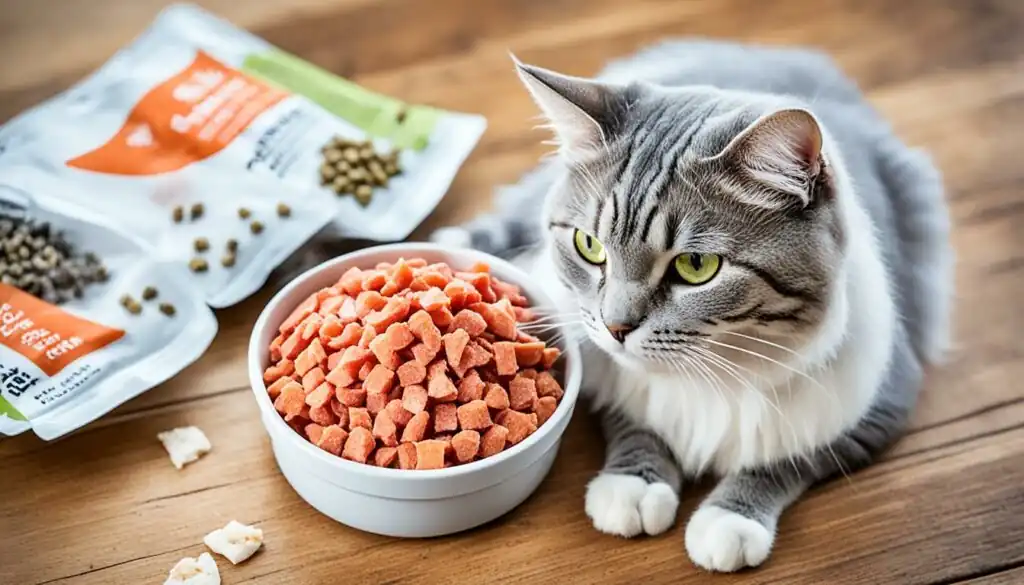
Lysine? Taurine? Other people’s cats seem to be eating it, and I’ve even seen a lot of pet nutrition products. Do my cats also need to eat it? Is there any problem with excessive intake, and what are their effects?
If you, a pet owner, have ever had such questions, this article will introduce you to the two nutrients “lysine” and “taurine”.
This article will take about 5 minutes to explain it to you one by one. After understanding it, you can judge whether you need to supplement it for your cat!
Why do cats need to supplement lysine and taurine?

Lysine and taurine are one of the “11 essential amino acids”. Since they cannot be synthesized by the body, they can only be ingested from food.
Therefore, a sufficient amount of amino acids in a cat’s dietary intake is very important for the cat’s body. They participate in many of the cat’s “body functions” and “synthesize muscles, skin and other tissues.” Enough essential amino acids can The cat is in good health.
What is lysine?
Lysine is “one of the important components of protein synthesis in muscle tissue.” For cats, it is also an important nutrient for maintaining health and vitality in the body.
However, because cats cannot synthesize it on their own, they need to supplement it through diet, such as fish, meat, etc.
Through the nutritional supplementation of a balanced diet, the effects of lack of lysine on muscle mass maintenance, immunity, fat metabolism, collagen formation, etc. can be avoided.
Lysine is not a universal nutrient! Lysine only affects “a single virus” in cats, which in turn affects the resulting nose problems (runny nose, sneezing, etc.).
But this is only helpful for “this single virus-related problem”. Other problems “caused by germs” and “immune-related” cannot be solved by lysine alone.
Supplementing lysine to cats, a summary of frequently asked questions
Does my cat need to take lysine?
The ancestors of cats have lived in the wild since ancient times and are naturally carnivores. A diet with a high proportion of meat makes the ancestors of cats less likely to worry about a lack of lysine.
However, as cats become domesticated and their lifestyle and diet changes, cats at home may need more lysine supplements under the following circumstances.
1. The diet is mainly composed of carbohydrates (high in starch) and lacks essential amino acids such as lysine.
2. Sensitivity to seasonal changes, sneezing, runny nose and other low mobility conditions.
Lysine is abundant in protein foods (meat, beans, etc.), and poultry, seafood, beef, and pigs are all foods rich in lysine.
What are the functions of lysine?
Lysine is an indispensable amino acid for protein synthesis in cats. It is very important for cats’ “development” and “tissue integrity”. It can also help “sound immune systems”. Its main functions are as follows:
1. Maintain required muscle mass
2. Help calcium absorption and promote collagen formation
3. Synthesize carnitine with methionine to help the body convert fatty acids into energy
4. Helps regulate cholesterol
What foods can supplement lysine?
| ingredients | Lysine content mg/100g |
| salmon | 2343 |
| milkfish | 1949 |
| beef shank | 1942 |
| bonito | 1941 |
| Chicken breast (boneless and skinless) | 1923 |
| pork shank | 1832 |
| Pork tenderloin | 1621 |
| Taiwanese sea bream | 1618 |
| shrimp | 1478 |
| mutton | 1435 |
| mackerel | 1237 |
| octopus | 920 |
| egg | 878 |
| wheat | 397 |
| red quinoa | 301 |
| Millet | 147 |
| corn | 116 |
| potato | 110 |
| sweet potato | 86 |
What will happen if a cat eats too much lysine?
Excessive intake of lysine will not bring any further benefits, but may bring risks of adverse effects. If a cat usually eats meat, there is basically no need to supplement additional lysine.
If your cat has a runny nose or other uncomfortable conditions, you can give it a little supplement and observe it for a period of time. If the problem persists, it is best to see a veterinarian as soon as possible to check on your furry baby.
Lysine is not a panacea. Many viral and immune-related problems cannot necessarily be solved by lysine.
What is taurine?
Taurine is one of the amino acids required by most mammals. It is an important nutrient for maintaining the normal operation of the “cardiac muscle” and “retina”.
Most animals can synthesize taurine by themselves in order to meet their internal needs (for example: humans, dogs, etc.). But cats need additional supplements, and the most direct way is to get them from food, such as meat, fish, seafood, etc., which will be explained in detail below in the article.
When cats are deficient in taurine, there will be no immediate problems. It will be a gradual process, but the damage caused will be irreversible.
Insufficient taurine may result in:
1. Retinal function is affected and vision deteriorates
2. Slowed growth and stunted development
3. Affect reproductive ability
4. Abnormal manifestations related to myocardium
Supplementing taurine for cats, a summary of frequently asked questions

Does my cat need to take taurine?
Generally speaking, it is difficult to detect taurine deficiency in cats at an early stage, and when discovered, the damage caused is “irreversible.”
Therefore, it is very important to consume “enough” amounts in daily diet. Nowadays, taurine should be included in common cat feeds.
Owners can find out whether their cat’s daily supplementary taurine intake is sufficient?
If necessary, supplement additionally, or follow the veterinarian’s recommendations.
Why is taurine important? What effect does it have?
Cats do not have the enzyme to synthesize taurine in their bodies. Once deficient, it can easily lead to “immune imbalance”, “poor vision” and “heart problems”.
Moreover, taurine is involved in “neurotransmission” in many parts of the body. It is no exaggeration to say that it is the most important amino acid for cats.
Taurine is found in all tissues and organs such as muscles, brain, retina, etc. It is important not only for cats, but also for most animals.
These functions and benefits of taurine help cats:
1. Prevent poor vision and protect vision health
2. Maintain normal function of the nervous system and help normal basal metabolism
3. Help the heart stabilize and maintain normal myocardial function
4. Promote healthy and good circulation and strengthen body functions
5. Maintain normal basal metabolism and help growth and development
Is there a problem with too much taurine for cats?
Each cat has different requirements for taurine based on different conditions. Generally, adult cats are recommended to supplement at least 400 mg daily.
Taurine is a water-soluble amino acid. If too much is taken in, it will be excreted in the urine through the kidneys.
And there are no reports that excessive intake of taurine will cause side effects on the body. When the cat needs it, you can help the cat to supplement it.
Rather than excessive intake, you should worry more about insufficient intake. It is recommended that owners pay more attention to their cats’ daily taurine intake!
What foods can supplement taurine?
| Ingredients | Taurine content (mg/100g) |
| scallop | 827 |
| Mussels | 655 |
| clams | 520 |
| Oyster | 396 |
| octopus | 388 |
| squid | 356 |
| mackerel | 207 |
| tuna | 200 |
| duck leg meat | 178 |
| salmon | 130 |
When eating fresh food to supplement taurine, pay attention to the fact that it is “easily soluble in water”
Because taurine is easily soluble in water, if you supplement taurine to your cat through “fresh food”, you should pay attention to the fact that cooking the food may cause the loss of taurine.
It is recommended that you use the “steaming” method and give the cat the soup as well.
If you only feed your cat meat, it will not be able to replenish the taurine that escapes into the water.
In addition to lysine and taurine, these amino acids are also important to cats

There are 11 types of essential amino acids for cats, and the functions and main food sources of each amino acid are different. Of course, if we are not owners who feed our cats fresh food, we don’t need to remember or pay special attention to each one.
Because generally feed and cans will be fully supplemented, but among them, you can remember the amino acids that are easier to lose, lack, and have increased needs to help you pay more attention to supplementation.
| Function | Problems caused by lack of | food source | ||
| 1 | Leucine | Helps develop muscles | weight loss | Bonito, bonito fish |
| 2 | isoleucine | Help generate energy | stunted development | Bonito, bonito fish |
| 3 | Valine | Maintain muscle mass and blood sugar | weight loss | Bonito, cheese |
| 4 | lysine | Composition of collagen, affecting specific viruses | weight loss | Soybeans, tuna |
| 5 | methionine | Participate in fat metabolism | severe weight loss | Soybeans, seaweed |
| 6 | Phenylalanine | Help calm nerves | nerve damage | Gourami, soybean |
| 7 | threonine | Stabilize blood sugar | Twitching, stiffness | Bonito, chicken breast |
| 8 | Tryptophan | Helps sleep normally | Loss of appetite | Gourami, soybean |
| 9 | Histidine | Control oxygen exchange | stunted development | bonito, mackerel |
| 10 | Arginine | Maintain liver function | Vomiting, diarrhea | Chicken breast, pork tenderloin |
| 11 | Taurine | Participate in immune stability and neurotransmission | Poor vision, abnormal heart muscle | Oysters, shrimps |
Muscles are strong! Supplement these 3 essential amino acids
“Leucine”, “isoleucine” and “valine” are three essential amino acids related to cat muscles. They play an important role in helping muscle development and helping to generate exercise energy.
As cats age, “muscles will slowly lose and muscle development is not as good as when they were young.” It is also easy to find that cats “have a tendency to lose weight.” You can supplement 3 more essential amino acids so that older cats have enough raw materials for their muscles. oh!
Lysine is not a universal nutrient, is it useful against viruses?
Many people think that lysine is an amino acid equated with immune function, but in fact it is mainly used to “synthesize cat collagen.”
In recent years, there is no unified statement on the effect of lysine on specific viruses in cats. If the cat has symptoms of infection, it is recommended to consult a veterinarian directly, ask the veterinarian to assist in treatment, and then ask whether supplementation is needed.
Most cats have been exposed to this virus, but it may not attack. Unless the body’s immunity is weak, “runny nose”, “watery eyes”, etc. may occur.
Many owners will find that sometimes it is effective for cats to take lysine and sometimes it is not. This is because cats are unhealthy for many reasons, not just this specific virus.
Although lysine is an essential amino acid, it is “not easily deficient, and current studies even suggest that excessive supplementation may affect cats’ immunity.”
Veterinarians recommend moderate supplementation of 250-500 mg per day. Lysine is definitely not a universal supplement!
